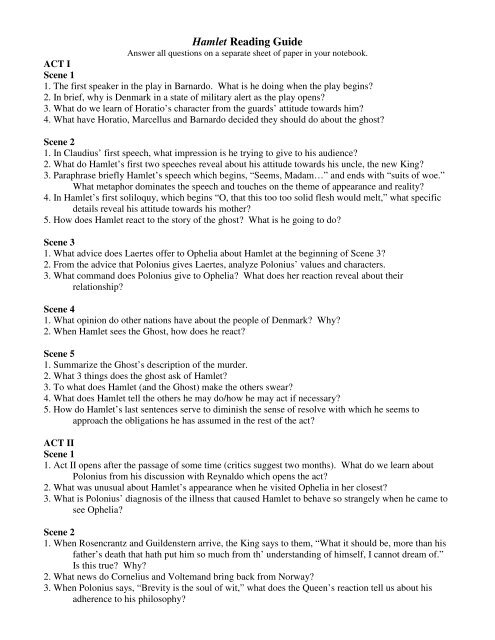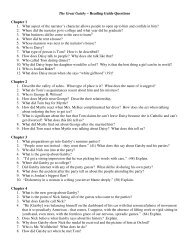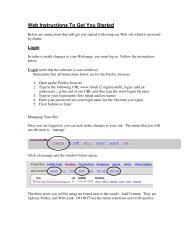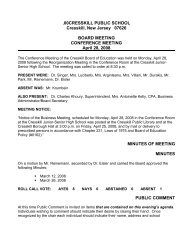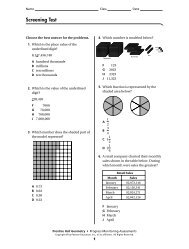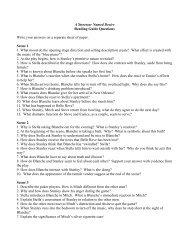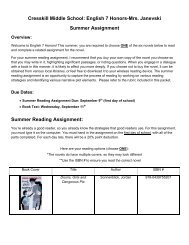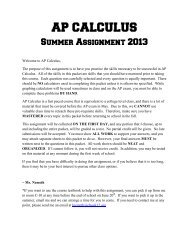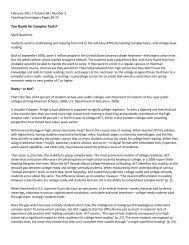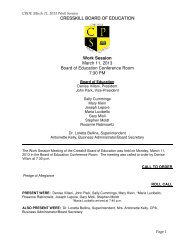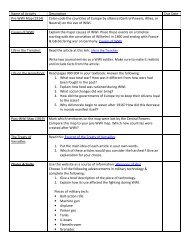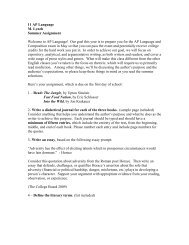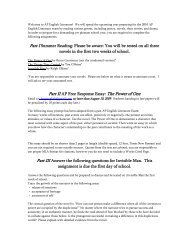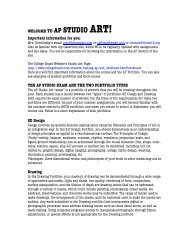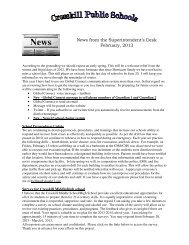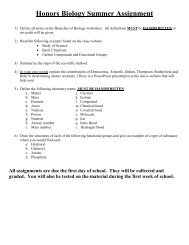Hamlet Questions (pdf)
Hamlet Questions (pdf)
Hamlet Questions (pdf)
Create successful ePaper yourself
Turn your PDF publications into a flip-book with our unique Google optimized e-Paper software.
<strong>Hamlet</strong> Reading Guide<br />
Answer all questions on a separate sheet of paper in your notebook.<br />
ACT I<br />
Scene 1<br />
1. The first speaker in the play in Barnardo. What is he doing when the play begins?<br />
2. In brief, why is Denmark in a state of military alert as the play opens?<br />
3. What do we learn of Horatio’s character from the guards’ attitude towards him?<br />
4. What have Horatio, Marcellus and Barnardo decided they should do about the ghost?<br />
Scene 2<br />
1. In Claudius’ first speech, what impression is he trying to give to his audience?<br />
2. What do <strong>Hamlet</strong>’s first two speeches reveal about his attitude towards his uncle, the new King?<br />
3. Paraphrase briefly <strong>Hamlet</strong>’s speech which begins, “Seems, Madam…” and ends with “suits of woe.”<br />
What metaphor dominates the speech and touches on the theme of appearance and reality?<br />
4. In <strong>Hamlet</strong>’s first soliloquy, which begins “O, that this too too solid flesh would melt,” what specific<br />
details reveal his attitude towards his mother?<br />
5. How does <strong>Hamlet</strong> react to the story of the ghost? What is he going to do?<br />
Scene 3<br />
1. What advice does Laertes offer to Ophelia about <strong>Hamlet</strong> at the beginning of Scene 3?<br />
2. From the advice that Polonius gives Laertes, analyze Polonius’ values and characters.<br />
3. What command does Polonius give to Ophelia? What does her reaction reveal about their<br />
relationship?<br />
Scene 4<br />
1. What opinion do other nations have about the people of Denmark? Why?<br />
2. When <strong>Hamlet</strong> sees the Ghost, how does he react?<br />
Scene 5<br />
1. Summarize the Ghost’s description of the murder.<br />
2. What 3 things does the ghost ask of <strong>Hamlet</strong>?<br />
3. To what does <strong>Hamlet</strong> (and the Ghost) make the others swear?<br />
4. What does <strong>Hamlet</strong> tell the others he may do/how he may act if necessary?<br />
5. How do <strong>Hamlet</strong>’s last sentences serve to diminish the sense of resolve with which he seems to<br />
approach the obligations he has assumed in the rest of the act?<br />
ACT II<br />
Scene 1<br />
1. Act II opens after the passage of some time (critics suggest two months). What do we learn about<br />
Polonius from his discussion with Reynaldo which opens the act?<br />
2. What was unusual about <strong>Hamlet</strong>’s appearance when he visited Ophelia in her closest?<br />
3. What is Polonius’ diagnosis of the illness that caused <strong>Hamlet</strong> to behave so strangely when he came to<br />
see Ophelia?<br />
Scene 2<br />
1. When Rosencrantz and Guildenstern arrive, the King says to them, “What it should be, more than his<br />
father’s death that hath put him so much from th’ understanding of himself, I cannot dream of.”<br />
Is this true? Why?<br />
2. What news do Cornelius and Voltemand bring back from Norway?<br />
3. When Polonius says, “Brevity is the soul of wit,” what does the Queen’s reaction tell us about his<br />
adherence to his philosophy?
4. Discuss the tone of <strong>Hamlet</strong>’s letter to Ophelia<br />
5. What is <strong>Hamlet</strong>’s purpose in talking to Polonius about the Sun’s breeding maggots in a dead dog?<br />
What does Polonius’ reaction (in asides) reveal?<br />
6. How do Rosencrantz and Guildenstern analyze <strong>Hamlet</strong>’s madness?<br />
7. <strong>Hamlet</strong> says to Rosencrantz and Guildenstern about their coming to see him, “I will tell you why; so<br />
shall my anticipation prevent your discovery.” What does this last phrase mean?<br />
8. What does <strong>Hamlet</strong> tell Rosencrantz and Guildenstern is the cause of his problem?<br />
9. <strong>Hamlet</strong> tells Polonius that he ought not to treat the players according to their desserts but much better;<br />
that is, according to what?<br />
10. What does “catch” mean in the last line of the act? What is <strong>Hamlet</strong> planning on doing?<br />
ACT III<br />
Scene 1<br />
1. What reasons do Claudius and Polonius give for becoming “lawful espials” to the meeting of <strong>Hamlet</strong><br />
and Ophelia?<br />
2. <strong>Hamlet</strong>’s most famous soliloquy (and perhaps Shakespeare’s most famous lines) begins, “To be or not<br />
to be…” Paraphrase the speech. In summary, why does <strong>Hamlet</strong> decide that to kill himself would<br />
be too risky? In what ways does the speech reflect <strong>Hamlet</strong>’s central problem in the play?<br />
3. Why does <strong>Hamlet</strong> urge Ophelia, “Get thee to a nunnery”? What are the two possible meanings?<br />
4. What lines suggest to you that <strong>Hamlet</strong> is aware that his conversation with Ophelia is being heard by<br />
eavesdroppers? If he senses their presence, what purpose might he have in what he says to<br />
Ophelia?<br />
5. How does Ophelia react to this interview with <strong>Hamlet</strong>?<br />
6. What conclusions does the King draw from what he overheard?<br />
Scene 2<br />
1. What is the purpose of drama, according to <strong>Hamlet</strong>?<br />
2. What does <strong>Hamlet</strong> most admire about Horatio’s character?<br />
3. How long has <strong>Hamlet</strong>’s father been dead when <strong>Hamlet</strong> and Ophelia discuss the matter before the play<br />
begins?<br />
4. What does Gertrude mean when she says “the lady doth protest too much, methinks “? What does her<br />
reaction tell us about her degree of complicity in the events that led up to her marriage to<br />
Claudius?<br />
5. Why is the play named as it is?<br />
6. What is the general tone of the comments that <strong>Hamlet</strong> makes to Ophelia before and during the play?<br />
7. How does the King react to the play?<br />
Scene 3<br />
1. Why does <strong>Hamlet</strong> not kill the King when he finds him praying? What is ironic about this inaction?<br />
Scene 4<br />
1. Why did <strong>Hamlet</strong> strike instantly at the figure behind the arras in his mother’s room?<br />
2. When <strong>Hamlet</strong> confronts his mother, how does her reaction underscore her innocence and guilt?<br />
3. What reasons does the ghost give for his second appearance?<br />
4. What does the Queen resolve to do at the end of Act III?<br />
ACT IV<br />
Scene 1<br />
1. In scene 1 of Act IV, what is the King’s major concern? In what line does he express it?<br />
2. What is the “foul disease” that the King is referring to?
Scene 2<br />
1. In scene 2, <strong>Hamlet</strong> compares Rosencrantz to a sponge. How does he justify this metaphor?<br />
Scene 3<br />
1. In considering what to do about <strong>Hamlet</strong>’s murdering Polonius, the King sees himself as restricted.<br />
How?<br />
2. Explain <strong>Hamlet</strong>’s comment to the King in response to the question, “Where is Polonius?”<br />
Scene 4<br />
1. When <strong>Hamlet</strong> is on the way to the ship that is going to bear him to England, he meets a captain in<br />
Fortinbras’ army. Where is the army going?<br />
2. In <strong>Hamlet</strong>’s soliloquy which begins, “How all occasions do inform against me…” how does <strong>Hamlet</strong><br />
evaluate his own actions and those of Fortinbras?<br />
Scene 5<br />
1. Describe Ophelia’s state of mind in scene five. Apart from having been driven to distraction or<br />
madness by the murder of her father, what is the significance to the content of her ramblings?<br />
2. In Act IV, both Laertes and Fortinbras can be seen as foils to <strong>Hamlet</strong>. How?<br />
3. Explain the meaning for each of the “flowers” that Ophelia is handing out.<br />
Scene 6<br />
1. How is it that <strong>Hamlet</strong> is the only man captured by the pirates when they attack the ship that is carrying<br />
him to England?<br />
Scene 7<br />
1. What is the King’s plan to murder <strong>Hamlet</strong>?<br />
2. What is ironic about the King’s advice to Laertes?<br />
3. Describe how Ophelia died.<br />
ACT V<br />
Scene 1<br />
1. What function do the first 55 lines of the Act serve?<br />
2. <strong>Hamlet</strong>’s reflections on the skull of a lawyer are characteristic of his mode of thought. How?<br />
3. How is the issue of <strong>Hamlet</strong>’s age confused or clarified?<br />
4. Who is Yorick, whose skull the gravedigger shows to <strong>Hamlet</strong>?<br />
5. Why is Ophelia’s funeral so brief and unceremonious?<br />
6. What might be Shakespeare’s purpose in having <strong>Hamlet</strong> jump into a grave with Ophelia and Laertes?<br />
Scene 2<br />
1. Interpret <strong>Hamlet</strong>’s line, “There’s a divinity that shapes our ends, rough-hew them how we will.”<br />
2. What finally happens to Rosencrantz and Guildenstern?<br />
3. What is <strong>Hamlet</strong>’s attitude toward Orsic?<br />
4. How does each of the following die: Gertrude, Laertes, Claudius, <strong>Hamlet</strong>? What is appropriate about<br />
each death?<br />
5. What does Horatio plan to do when he knows that <strong>Hamlet</strong> is dying?<br />
6. What is the impact of Fortinbras’ appearance eon stage at the end of the play?


